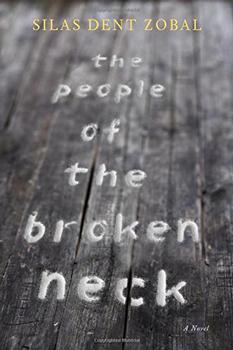Summary | Excerpt | Reviews | Beyond the Book | Read-Alikes | Genres & Themes | Author Bio

This article relates to The People of the Broken Neck
 In People of the Broken Neck, a series of mysterious messages, scribbled in salt, follow the Sawyers as they flee from the authorities all across the country. Cryptic communications, especially when interlinked with crimes, have always been intriguing, and the ones in this novel reminded me of ransom notes even if they make no overt demands.
In People of the Broken Neck, a series of mysterious messages, scribbled in salt, follow the Sawyers as they flee from the authorities all across the country. Cryptic communications, especially when interlinked with crimes, have always been intriguing, and the ones in this novel reminded me of ransom notes even if they make no overt demands.
It is believed that America's first ransom note was sent in the summer of 1874 and followed the kidnapping of two boys, sons of Christian Ross, a merchant who had set up shop in the northwest suburbs of Philadelphia. It is unclear why, but the criminals returned the five-year-old son, Walter, but held on to the four-year-old Charlie. Distraught, Christian Ross approached the local police. But the young force had never heard of a kidnapping before and didn't know how to deal with one, and instead assured Christian that his son would return in due time.
 All that Christian received in a couple of days was a ransom note written in ink. "Mr Ros, be not uneasy, you son charley bruster be all writ we is got him and no powers on earth can deliver out of our hand," the note, riddled with spelling errors, warned. "You wil have to pay us before you git him from us, and pay us a big cent to," the note read. "if you put the cops hunting for him you is only defeeting yu own end."
All that Christian received in a couple of days was a ransom note written in ink. "Mr Ros, be not uneasy, you son charley bruster be all writ we is got him and no powers on earth can deliver out of our hand," the note, riddled with spelling errors, warned. "You wil have to pay us before you git him from us, and pay us a big cent to," the note read. "if you put the cops hunting for him you is only defeeting yu own end."
A second such note made an appearance five days later, demanding the equivalent of $400,000 in today's money: "This is the lever that moved the rock that hides him from yu $20,000. Not one doler les – impossible – impossible – you cannot get him without it."
 Despite the warnings, Christian Ross brought the notes to the police who immediately created alerts up and down the Northeast. Word soon got around the country, with many pretending to have information about little Charley in exchange for a reward. A total of 23 such ransom notes were received until the perpetrators were tracked down in New York, and killed by the police. A third abettor was arrested and tried, but he claimed innocence, and, in the end, Charley never returned home, despite the money and labor spent on tracking him down. Christian Ross wrote a memoir about the ordeal.
Despite the warnings, Christian Ross brought the notes to the police who immediately created alerts up and down the Northeast. Word soon got around the country, with many pretending to have information about little Charley in exchange for a reward. A total of 23 such ransom notes were received until the perpetrators were tracked down in New York, and killed by the police. A third abettor was arrested and tried, but he claimed innocence, and, in the end, Charley never returned home, despite the money and labor spent on tracking him down. Christian Ross wrote a memoir about the ordeal.
Incidentally, Charley's grand-nephew, Chris Ross, is a ten-term state representative from Pennsylvania.
Depiction of Charlie and his brother, courtesy of Frank Leslie's Illustrated Newspaper
Ransom Note, courtesy of www.smithsonianmag.com
Likeness of Charlie Ross on a Missing Child poster.
Filed under People, Eras & Events
![]() This article relates to The People of the Broken Neck.
It first ran in the November 2, 2016
issue of BookBrowse Recommends.
This article relates to The People of the Broken Neck.
It first ran in the November 2, 2016
issue of BookBrowse Recommends.
Your guide toexceptional books
BookBrowse seeks out and recommends the best in contemporary fiction and nonfiction—books that not only engage and entertain but also deepen our understanding of ourselves and the world around us.